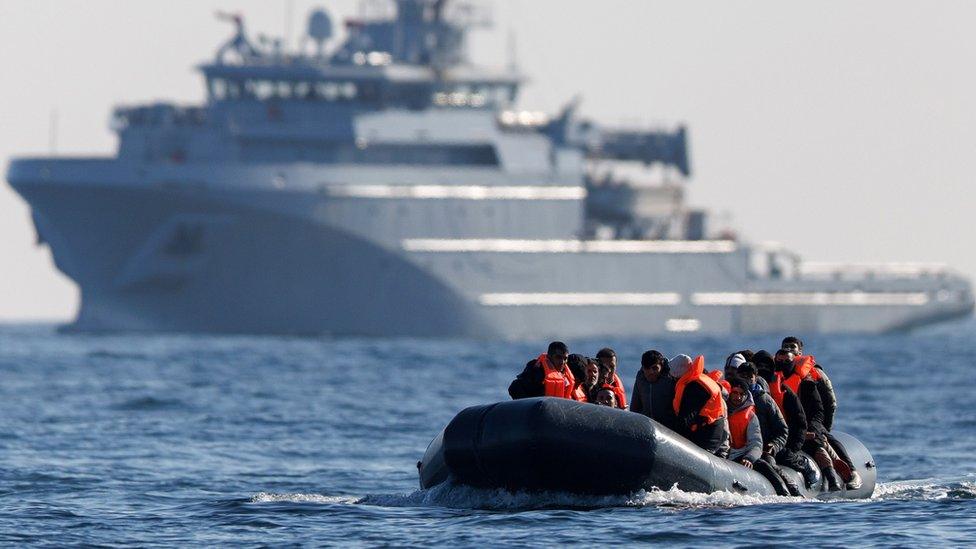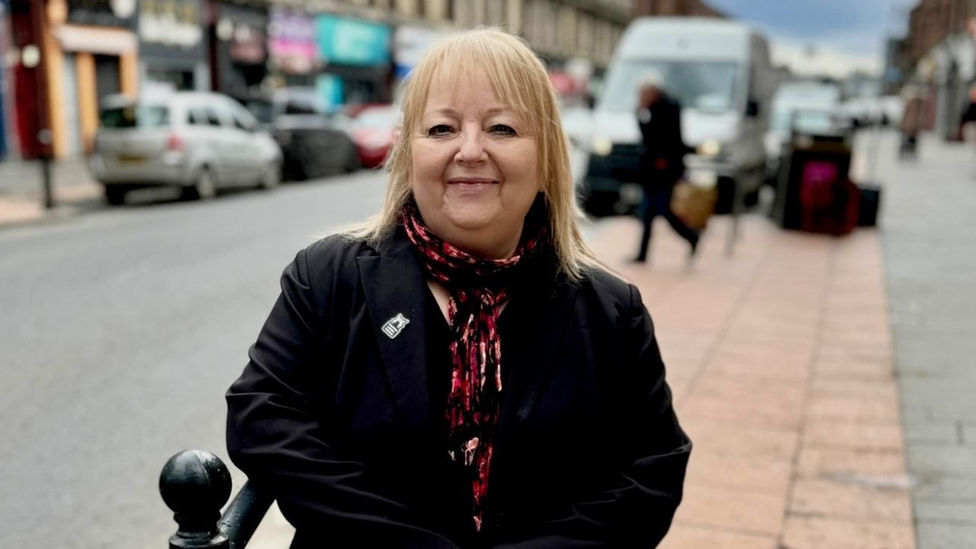MP fears detained asylum seeker may be sent to Rwanda
- Published

The UK government believes its Rwanda policy will deter migrants from "illegally" crossing the Channel to the UK in small boats
The UK government has said it will look into the case of a Glasgow-based Iranian national believed to have been identified for deportation to Rwanda.
The case of 21-year-old Abdullah Salimi was raised in the House of Commons by SNP MP Anne McLaughlin.
She said her constituent had been detained on Tuesday while attending a routine Home Office appointment.
She said he had then been driven for 10 hours to a detention centre in the London area.
Ms McLaughin also claimed that Mr Salimi had been given "no food or water" on the journey, had his phone confiscated and was without legal representation.
The Glasgow North East MP told the Commons: "I am his MP. I have the right to know what's going on in his life and the right to represent him."
The Home Office minister Tom Pursglove said it was "entirely right and proper that people are detained on a legal basis for the purposes of removal under this policy".
He added: "There are always safeguards around that. We will of course in the normal way look very carefully at any concerns she wishes to raise.
"I recognise that she is entirely opposed to the policy objective that we're seeking to advance - there is a principle disagreement there.
"But on those specific points if she'd like to share them with me I will gladly ensure she receives a full response."
It came as the government confirmed that migrants identified for deportation to Rwanda have started to be detained in a series of operations across the UK.
The policy seeks to deter people from crossing the English Channel from France in small boats.
The Home Office has not said how many people have been detained, but more operations are due to be carried out in the coming weeks.
The announcement came the day before people in England go to the polls in local elections.
Legislation aimed at reviving the plan to send some asylum seekers to the east African country was passed into law last week.
The government says any asylum seeker entering the UK "illegally" after 1 January 2022, from a safe country such as France, could be sent to Rwanda.
They would have their asylum claims processed there, rather in than the UK.
If successful, they could be granted refugee status and allowed to stay in the landlocked east-central African country.
If not, they could apply to settle in Rwanda on other grounds, or seek asylum in another "safe third country".
No asylum seeker would be able to apply to return to the UK.

Ms McLaughlin raised Mr Salimi's case in the House of Commons
The government had previously said it was aiming for flights to Rwanda to take off by the spring but now says this should happen in nine to 11 weeks - although the plan could still be held up by legal challenges.
After the Supreme Court ruled that the scheme was unlawful in November of last year, the UK government introduced a bill stating that Rwanda is a safe country.
The legislation - which was finally approved on 22 April after intense political wrangling - orders the courts to ignore key sections of the Human Rights Act.
It also compels the courts to disregard other British laws or international rules - such as the international Refugee Convention - which would block deportations to Rwanda.
The Supreme Court had ruled unanimously that the Rwanda scheme was unlawful, with judges raising concerns that genuine refugees would be at risk of being returned to their home countries, where they could face harm.
The ruling also cited concerns about Rwanda's poor human-rights record and its past treatment of refugees, with judges also saying that the UK government has previously Rwanda over "extrajudicial killings, deaths in custody, enforced disappearances and torture".
Responding to the initial detentions, Home Secretary James Cleverly said: "Our dedicated enforcement teams are working at pace to swiftly detain those who have no right to be here so we can get flights off the ground."
Home Office director of enforcement Eddy Montgomery said teams were trained to ensure detentions were carried out safely.
He added: "It is vital that operational detail is kept to a minimum, to protect colleagues involved and those being detained, as well as ensuring we can deliver this large-scale operation as quickly as possible."
Provisional figures released by the Home Office show a total of 7,567 people crossed the Channel in boats between January and April of this year - 27% more than the number of arrivals recorded in the same period last year.